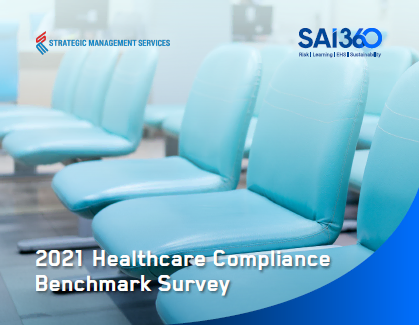2021 Healthcare Compliance Benchmark Report
Executive summary
This report provides results from our 12th annual Healthcare Compliance Benchmark Survey, conducted by SAI360 in collaboration with Strategic Management Services, LLC. Richard P. Kusserow, former DHHS Inspector General, provided the analysis of the results.
The survey’s objective was to understand the status and progress of compliance program development in the U.S. healthcare industry. The survey asked about the current state of healthcare compliance, including demographic data, resource levels, reporting relationships, compliance program operations, challenges, and priorities for 2021.
 Respondents to our 2020 survey suggested additional questions, wanting to understand the impact of the Covid-19 pandemic on Compliance Office operations. Three new questions were tied to the DOJ’s new 2020 Compliance Program Effectiveness Evaluations Guidelines.
Respondents to our 2020 survey suggested additional questions, wanting to understand the impact of the Covid-19 pandemic on Compliance Office operations. Three new questions were tied to the DOJ’s new 2020 Compliance Program Effectiveness Evaluations Guidelines.
These findings and an analysis of the significance of results are based upon respondents from organizations representing nearly every state in the U.S., ranging from very small entities to large healthcare systems. The largest blocks of respondents came from hospitals and behavior health, followed by physician practices, hospice, home health and MCOs.
2021 survey highlights
-
- Investment in compliance: Fewer organizations anticipated that budgets would increase than last year, moving from a third in 2020 to a fifth in 2021 of respondents. Those expecting decreases went from 14 to 20% since the prior year.
- Tenure: The average experience of a Compliance Officer is nearly 10 years.
- Top 3 priorities for 2021:
- Evidencing Compliance Program Effectiveness
- Improving Program Manager Ongoing Monitoring,
- Increasing Leadership Support
- HIPAA: Over 80% are in charge of privacy plus about a third also oversee security and cybersecurity, which remain top priorities as in the past three years; arrangements with referral sources and “chargemaster” accuracy are on the rise as priorities.
- Independent Program Effectiveness Evaluations: Now stressed as important by both the OIG and DOJ, nearly half of respondents say they’ve done an evaluation in the last three years — however, 40% reported they haven’t.
- The pandemic: More than half of the Compliance Officers confirmed that it’s having a significant to major impact on their ability to meet obligations.
- Enforcement: High rates of reported encounters with enforcement agencies indicate it is not if there will be encounters — but when it will happen.
- Can you prove that your organization has a Culture of Compliance? While the DOJ’s Guidelines ask many questions relating to being able to evidence a Culture of Compliance, only about 30% used independent sources to demonstrate compliance effectiveness.



